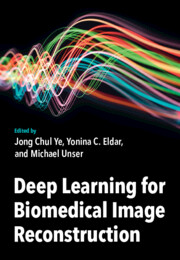Book contents
- Frontmatter
- Dedication
- Contents
- List of Contributors
- Preface
- Part I Theory of Deep Learning for Image Reconstruction
- Part II Deep-Learning Architecture for Various Imaging Architectures
- 5 Deep Learning for CT Image Reconstruction
- 6 Deep Learning in CT Reconstruction: Bringing the Measured Data to Tasks
- 7 Overview of the Deep-Learning Reconstruction of Accelerated MRI
- 8 Model-Based Deep-Learning Algorithms for Inverse Problems
- 9 k-Space Deep Learning for MR Reconstruction and Artifact Removal
- 10 Deep Learning for Ultrasound Beamforming
- 11 Ultrasound Image Artifact Removal using Deep Neural Networks
- Part III Generative Models for Biomedical Imaging
7 - Overview of the Deep-Learning Reconstruction of Accelerated MRI
from Part II - Deep-Learning Architecture for Various Imaging Architectures
Published online by Cambridge University Press: 15 September 2023
- Frontmatter
- Dedication
- Contents
- List of Contributors
- Preface
- Part I Theory of Deep Learning for Image Reconstruction
- Part II Deep-Learning Architecture for Various Imaging Architectures
- 5 Deep Learning for CT Image Reconstruction
- 6 Deep Learning in CT Reconstruction: Bringing the Measured Data to Tasks
- 7 Overview of the Deep-Learning Reconstruction of Accelerated MRI
- 8 Model-Based Deep-Learning Algorithms for Inverse Problems
- 9 k-Space Deep Learning for MR Reconstruction and Artifact Removal
- 10 Deep Learning for Ultrasound Beamforming
- 11 Ultrasound Image Artifact Removal using Deep Neural Networks
- Part III Generative Models for Biomedical Imaging
Summary
The development of deep learning reconstruction methods for accelerated MR acquisitions has been an ongoing area of research for the last several years. It has been repeatedly demonstrated that deep learning methods can outperform classic reconstruction approaches in terms of both quantitative image metrics like MSE to ground truth as well as qualitative reader studies where radiologists have been questioned in a subjective way. We present the basics and well-known approaches for MR image reconstruction via deep learning.
Information
- Type
- Chapter
- Information
- Deep Learning for Biomedical Image Reconstruction , pp. 166 - 176Publisher: Cambridge University PressPrint publication year: 2023
